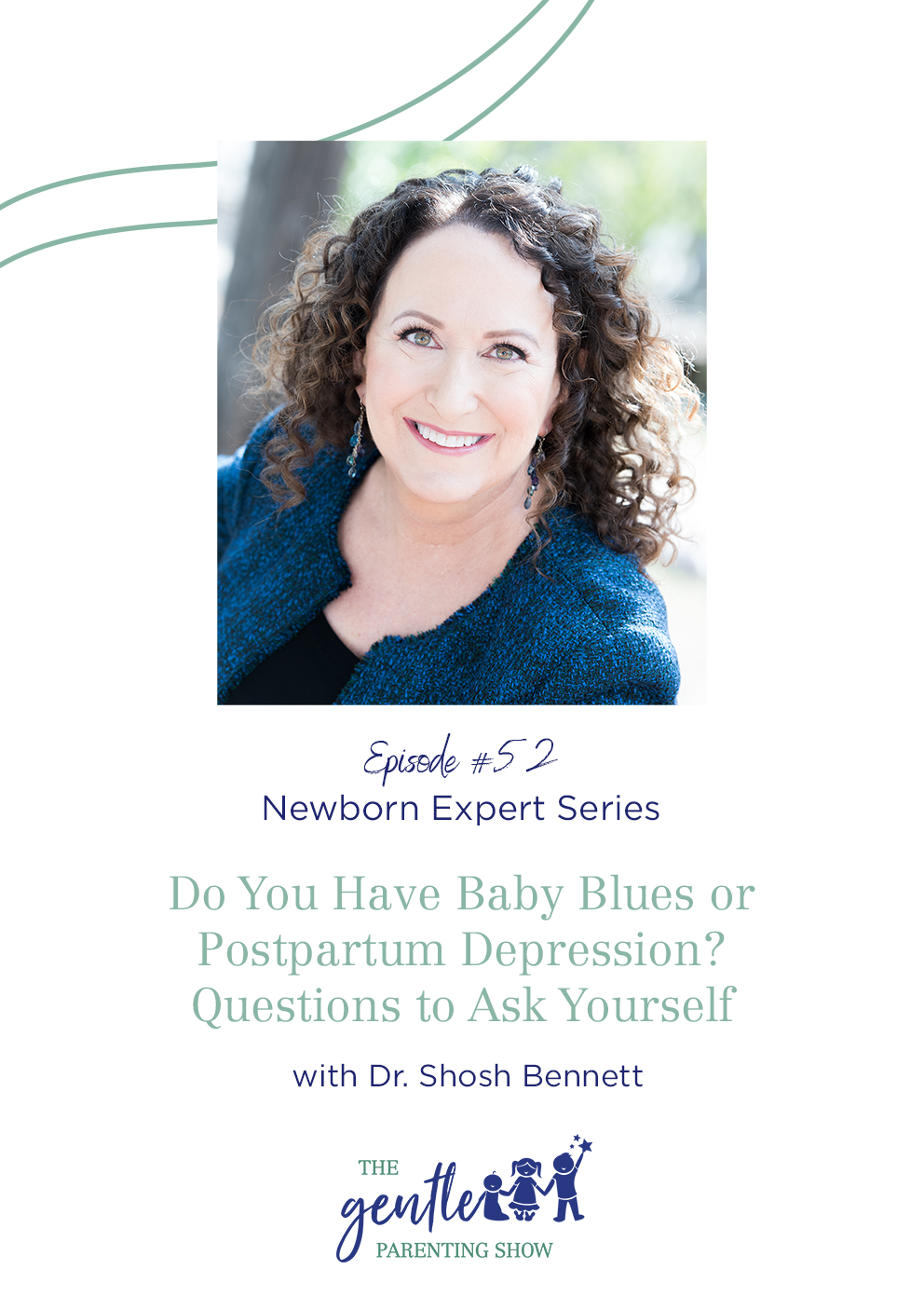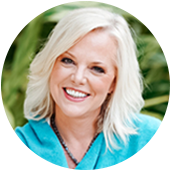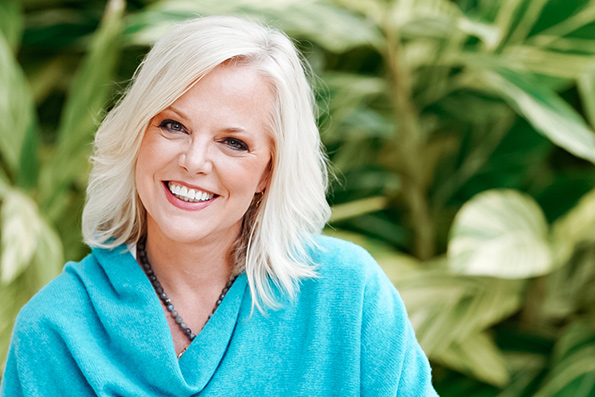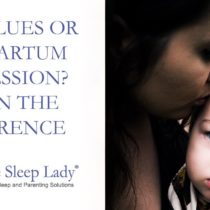We are so excited for today’s Newborn Expert Series episode of the Gentle Parenting Show with Dr. Shosh Bennett. In today’s episode of The Gentle Parenting Show, Kim sits down with her longtime friend and colleague, Dr. Shoshana Bennett. If you’d like to hear Dr. Shosh’s first episode all about the myths of motherhood, listen HERE. Dr. Shosh, a clinical psychologist, is an expert on prenatal and postpartum depression and related mood and anxiety disorders. She is the author of the best-selling book “Postpartum Depression for Dummies”, as well as “Pregnant on Prozac”, “Children of The Depressed” and co-author of “Beyond the Blues.” Kim and Dr. Shosh discuss the difference between baby blues and postpartum depression with things to ask yourself and symptoms to look for.
Differences Between Postpartum Depression and Baby Blues
Kim and Dr. Shosh start their discussion by going over the difference in signs and symptoms of baby blues and postpartum depression. Baby blues are expected. In fact, 80% of new moms experience the ups and downs of baby blues. But, these are mild ups and downs. Having baby blues doesn’t feel like you’ve lost yourself. Baby blues usually go away about 2-3 weeks after delivery. After this, you feel like yourself, and the blues aren’t getting in the way of day-to-day activities or sleep.
Postpartum depression is a perinatal mood and anxiety disorder (PMAD). The word “perinatal” covers pregnancy through a year postpartum. PMAD can happen during pregnancy as well. In fact, Dr. Shosh says that “we are at our very most vulnerable for mood issues and mental health issues during the perinatal period.” If you had mental health struggles before pregnancy and birth, it’s important to watch your mental health during the perinatal period. Postpartum depression is one of the six PMAD disorders. In fact, 15-20% of new moms, or 1-in-7 globally have PPD. Postpartum depression affects women in all cultures, countries, and communities.
So, what’s the difference between baby blues and postpartum depression? According to Dr. Shosh, it all comes down to severity. Postpartum depression can happen immediately at birth. It can also be as mild as the baby blues but doesn’t go away after that 2-3 week period. In fact, if the baby blues start spiraling and worsening in symptoms even in those first few weeks, that’ a sign of postpartum depression. The onset of postpartum depression can change based on a woman’s genetic and mental makeup and can hit even 6-months post-delivery.
Questions to Ask Yourself with Postpartum Depression
It can be easy to dismiss postpartum mental health struggles just being a new parent. You’re tired, life is different, so you think your system is just catching up. If you’re unsure if you have postpartum depression or a case of the baby blues, ask yourself these questions:
- Am I putting myself down often?
- Do I feel like myself?
- When it’s time for sleep, does it come easily?
- Do I feel hope?
- Do I feel fit to be a mother?
- Am I quick to get angry and lose my temper?
- Is my mood getting in the way of my daily functions?
If you answered yes to these questions, you may have postpartum depression.&
You may have an idea in your mind of what postpartum depression is supposed to look like on yourself or a loved one – get rid of it. Postpartum depression and any PMAD disorders can take on a different form in every woman. Dr. Shosh says “if you have any picture in your mind of how it might look, get rid of it. She’s not necessarily in a bathrobe crying unable to function. It’s important to ask the right questions.”
Can Fathers or Adoptive Parents Experience Postpartum Depression?
A lot of PMAD research and treatment is focused on birth moms because of the hormonal upheaval that occurs with birth. But, anyone with a baby can experience PMAD or postpartum depression. If fathers, adoptive parents, partners, etc. have had depression previously, it makes them high risk for PPD. 10% of fathers or non-birth parents will experience postpartum depression.
In fact, if the birth mother is experiencing depression, it makes the partners much more high risk at 24-50% more likely. Stress and sleep deprivation are huge triggers for postpartum depression, but they’re also part of the healing process. As partners in parenthood, both parents need to make sure the other is getting proper help. Parents NEED to be well to have children be well.
Shame Around Postpartum Mental Health
If you’re experiencing PPD, or know someone who is, it’s important to understand that this isn’t a weakness or character flaw. Just because you’re experiencing postpartum depression doesn’t mean you’re forever mentally ill. PMAD disorders are considered acute disorders, not chronic. This means that as long as you’re getting proper help, these mental health struggles go away.
Dr. Shosh says “this is not a character weakness, this is not a flaw of some kind, and it’s not anybody’s fault. We are so quick to blame ourselves and it’s not fair.” So often, women blame themselves for struggling with PMAD, but Dr. Shosh gives a great perspective. She asks if we’d blame ourselves for getting cancer or a chronic illness. We (hopefully) wouldn’t! The same goes for postpartum depression – we cannot control or hormones or genetic makeup. We can’t blame ourselves.
What to Do if You Have Postpartum Depression
The most important thing to do if you’re experiencing PPD is to get in touch with a specialist who can help you. Dr. Shosh asks you to consider if something was wrong with your baby. You would find help for your baby no matter the cost or insurance limitations! Take care of yourself in that same way. She says that “the most loving thing you can do for your entire family, especially that baby, is getting the right kind of help.”
The “right” kind of help for postpartum depression is finding a psychotherapist who has been trained in PMAD. It is not good enough to go to any therapist when you’re experiencing PPD. Just like alcoholism or addiction is a specialty in therapists, so is postpartum depression. Visiting a specialty therapist is part of the recovery process. It is short-term therapy. Before choosing a specialist, ask your therapist these questions:
- How have you been trained to treat PMAD?
- Have you worked with many women with PMAD?
- How long have you helped with PMAD?
Critical Components of Postpartum Care
Together, with the right therapist, you should have a wellness strategy to help beat postpartum depression. A huge component of this wellness strategy is sleep. Both Kim and Dr. Shosh know that focusing on sleep can feel impossible with a newborn, but it’s crucial. They discuss sleep strategies below.
Another critical component is exercise and relaxation. Even in recovery, before that 6-week check-up, new moms can do breathing exercises to relax and ease their minds. Women who have high-risk pregnancies and can’t exercise can also do this. Nutrition is also important, and proper nutrition combined with movement and frequency can protect serotonin in the brain.
Dr. Shosh provides her patients with communication support, which is part of the wellness plan for postpartum depression. In fact, she has 7 steps to wellness plan for PMAD that changes for every woman and family.
Dealing with postpartum depression doesn’t always have to include medication. Medication is great and can be discussed and included if that’s what is best, but there are non-invasive strategies as well. This is why it’s so important to work with a therapist who knows what they’re doing. Dr. Shosh warns against any therapist saying you need to stop breastfeeding so you can medicate. A lot of PMAD medication is ok for breastfeeding, and your provider should know.
Sleep and Healing and Preventing PMAD
Many of Dr. Shosh’s patients are 2nd or 3rd-time parents who want to prevent PMAD the next time around. Sleep is a huge part of the prevention and recovery of postpartum depression. A goal to prevent and help with PPD is for 5 hours of uninterrupted sleep at night. Now, this comes after the first 2-4 weeks post-delivery. For those first few weeks, breastfeed on demand. After that, your body can still maintain a full milk supply while you and your baby have longer stretches of sleep. Kim has a lot of resources for newborn sleep to help.
If you are watching your sleep, you can guard against postpartum depression. Getting as close to 5 hour stretches as you can, can make all the difference between having depression or not. You need to prioritize your health and your family’s health as much as that new baby. Dr. Shosh closes by saying “taking care of yourself isn’t just a nice thing to do for your kids, it’s essential to their well-being for you to be ok. The most responsible thing you can possibly do is get help.”
Connect and Work with Dr. Shosh
- Dr. Shosh’s WEBSITE with free resources and consultation options

